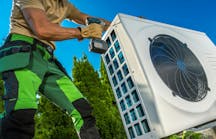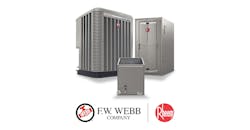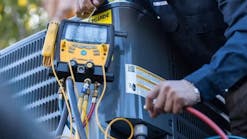By Mia Peterson
Choosing the heating, ventilation, and air conditioning (HVAC) industry is a smart career move because it is thriving across the U.S. But while working as a new HVAC technician might be a great career choice, remember that it isn’t free from safety risks. For this reason, technicians must be aware of the safety guidelines that only experienced heating and cooling companies keep, and always bear them in mind. Here are the most important ones.
Assess the Situation
Working in the heating and air conditioning industry, new HVAC technicians must learn how to assess the situation before jumping into the task in order to identify any hazards or safety threats. The Centers for Disease Control and Prevention recommends professionals working around and with electrical currents to take up additional electrical safety training.
Alternatively, one must consider taking up a short electrician-training program if electrical safety and precautions training is not a part of the on-the-job training.
Know what you’re working up against with when new to the profession. For example, identify any hazards so that you can take essential safety precautions before work begins. Spend some time in getting the job done, but also make sure not to rush things. Assess the situation first to prevent winding up injured.
This OSHA guide is another useful resource on controlling electrical hazards.
Double-check Your Equipment
On a typical day, HVAC technicians may have to work in multiple job sites. For this reason, double-check your equipment and know the required tools for every job order. A few of those necessary tools include wire strippers, wrenches and a vacuum gauge. Make sure they’re functional for safety and efficiency. With properly working HVAC equipment, you can also reduce the chance of an injury when performing repairs, maintenance or installations.
Gas Cylinders in Trucks
HVAC technician trucks can have a temperature reaching to at least 100 degrees in the summer. And when combined with the heat generated by the R-410A gas cylinder, pressure can reach up to 366 psig.
For example, a large, 1500-sq.in. gas cylinder can generate pressure of up to 549,000 psig. With such hot temperatures, the cylinder can take off and explode like a rocket if it’s damaged or it fails.
Always watch out for extremely high summer temperatures and be extra careful when working with or around gas cylinders in HVAC trucks.
Put Your Safety First
Just like in other professions, there are risks involved when working with air conditioning equipment and tools. New air conditioning technicians should always put safety first.
Before working, you should always wear protective gears – something you might have been taught of if you’ve attended a welding school. A few gears HVAC technicians need are,
● Face shields for protection from dangerous HVAC liquids and chemicals
● Respiration gears when unsafe air contaminants exist
● Hard hats when working in an area where some falling objects and low lying beams might pose hazards
● Work shoes and boots for protecting your feet from falling or heavy objects
● Proper clothing for protecting the hands, skin and body from harsh temperatures
● Earplugs for protecting against hearing loss especially when working in areas where there is at least 90 decibels
● Safety glasses for stopping flying objects and debris from getting into your eyes.
Additional Safety Tips
Once again, check that your HVAC equipment is clean, updated and doesn’t need replacement. Otherwise, you might suffer from an injury from working with worn out or broken equipment. Make sure that those needing replacement are replaced, to keep yourself safe.
(NOTE TO EMPLOYING CONTRACTORS: making sure equipment is in good working condition can keep your technicians safe. Also, you should always remind them to wear protective gears to prevent accidents and injuries, such as hearing or eyesight lost or broken limbs).
Wear protective and safety gear to avoid health issues as well, because you might always be exposed to harmful contaminants, gases and dusts in this job.
For tasks in which you’ll be exposed to these elements, make sure to wear a face shield or goggles to protect your eyes from any chemicals as well as a respirator to avoid inhaling chemicals.
THIS ARTICLE describes inhalation risks that mechanics and installers face.
Chemical Safety
Take note of chemicals because you’re more likely than not be exposed to them. Cleaning liquids, detergents, solvents and refrigerants, to name a few, can pose serious health risks if mishandled.
There are also cases when some chemicals can explode, causing injury.
So again, wear protective gear – and gloves when handling liquids that can burn your skin. You should also remember safety procedures and proper handling when storing as well as transporting chemicals.
Extra precaution is also needed if you’re a new HVAC technician who lacks in-depth knowledge on the most common HVAC system chemicals.
It is better to be aware of what you’re going up against than regretting later, so you should ask an expert HVAC technician if you’re unsure about a particular chemical before handling/transporting/storing it. (Ed. note: New technicians, in fact all technicians working for an HVACR contractor, will ideally be made aware of all safety hazards during orientation and/or on-the-job training or classroom training.)
Being new to the HVAC system industry, you should know and understand crucial safety guidelines for new technicians for your own protection.
Safety Always FIRST
Always put safety first when working with and around heating and cooling systems and tools. Wear protective gear, assess the situation, take note of summer temperatures, and have adequate knowledge on chemicals. You will master all these things in time with additional training, help from your seniors and employer, and some resources like this article. Share it on Facebook and help fellow new AC mechanics and installers today.
Mia Peterson is marketing coordinator at Penguin Heating & Air Conditioning.










